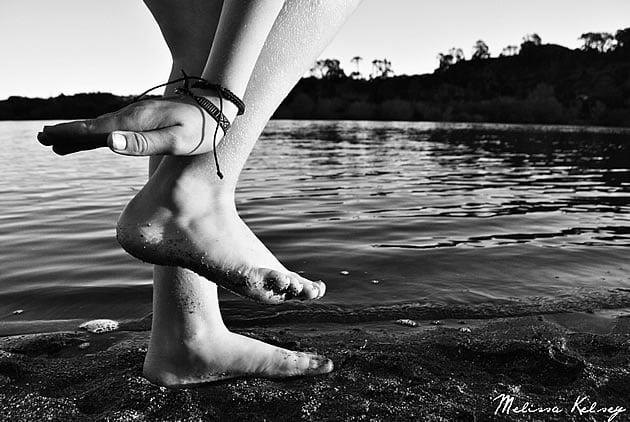A Level Photography: A Fantasy Theme
Last Updated on January 5, 2022
Art and Photography students are ofttimes drawn towards projects that explore imaginary worlds – longing to produce images inspired past fairy tales, stories and random dreams. In many cases, teachers view these with apprehension – knowing all too well the risks associated with such beginnings.This CIE As Coursework submission by Melissa Kelsey of ACG Strathallan Higher was awarded 100% and placed tiptop in New Zealand for Every bit Level Photography in 2011. Melissa's project is an excellent example of how a fantasy theme should be approached – a reminder that sometimes the nearly risky starting points can be the best of all.
Some of Melissa'due south sketchbook pages are included in our new book: Outstanding High Schoolhouse Sketchbooks . This volume has loftier-resolution images and so that fine details and note are clear, making it an excellent resource for students and schools. Larn more!

After beginning the year investigating colour, photographic techniques and compositional devices (such every bit 'filling the frame', looking at Japanese lensman Ken Ohara), Melissa formulated her own theme, inspired by Where the Wild Things Are , Peter Pan (the Lost Boys) and Lord of the Flies . Choosing to focus on a child's figure in a wild and free environment, Melissa dressed her younger brother in camo-print and animal skins, with smears of vegemite on his face up, and set him loose in a visually rich, natural setting.

The key to Melissa'due south success, bated from her obvious compositional and technical skill, is her investigation of the theme through quality, real-globe subject thing. The biggest danger with a fantasy topic is that a student volition revert to using their imagination merely: that they will describe from fantasy at the expense of the globe around them. Melissa draws solely on elements rooted in reality: a younger brother, forest scenes and antique weapons and tribal headpieces from Tanzania. Despite the magical, fun-filled essence to Melissa'southward stunning, ethereal photographs, the scenes that she creates – correct from the outset – are built from advisedly chosen pieces of the real world.

As the yr progresses, Melissa develops her understanding of composition with reference to artist models, such as photographer Arno Rafael who, she notes, 'juxtaposes bodies and landscapes in surprising ways'. Rafael inspires Melissa to chronicle aspects of the forest environs to those of the man trunk (with the integration and echoing / reflection of forms obvious in the sketchbook page below), helping to reinforce the idea that the boy has 'become 'at one' with the environment around him'.


Melissa challenges the boundaries of photography (encouraged by her teacher Mrs Jo Palmer – whose students frequently attain Top in the Land and Top in the World for Cambridge A Level Photography), studying the paintings of New Zealand artist Elizabeth Rees (a reminder that a student need not always written report artists in the same area of specialty as them). Melissa incorporates dripping, inky backgrounds – drips of dye on acetate – which are scanned and digitally integrated with photographic images using Photoshop: frozen moments of motility, alloyed in the one piece of work.
Melissa writes:
On this page I have captured serial of snapshots of the boy in move to show energy and movement. I have overlapped most photos with dibbles to show them acting as trees to create the surround. The series of silhouettes give the appearance of him showing ownership of the environment, through showing him attacking and running.


From here Melissa investigates more than formal compositions, inspired by artist Charmaine Olivia. Silhouettes begin to dominate the works, with elements framed and centrally positioned, showing the intriguing details of the first-hand props that Melissa uses to express the notion that the boy is reverting to a more than aboriginal, primal existence. With a scarce and considered utilise of color, Melissa allows the stiff dissimilarity of black and white to boss her portfolio. Even in smaller, exploratory works, she demonstrates a sophisticated handling of form, with positive and negative shapes advisedly considered within competent, well-balanced compositions.

Continually working with textured layers (such as the abstract patterns created from forest branches), Melissa'due south concluding phase of evolution shows the boundary betwixt the homo and animal earth dissolving. Animals are overlapped with the male child's face, suggesting that he has 'conquered and dominated' the wood environment.


Melissa'south final As Photography piece, the sepia toned epitome beneath, is a striking piece of work that aptly concludes her Coursework project.

Desire to see more than spectacular student artwork? Please visit our Featured Art Projects.

Amiria has been an Art & Blueprint instructor and a Curriculum Co-ordinator for seven years, responsible for the course design and assessment of student work in two loftier-achieving Auckland schools. She has a Bachelor of Architectural Studies, Bachelor of Compages (Get-go Class Honours) and a Graduate Diploma of Teaching. Amiria is a CIE Accredited Art & Design Coursework Assessor.
Source: https://www.studentartguide.com/featured/a-level-photography-fantasy
Post a Comment for "A Level Photography: A Fantasy Theme"